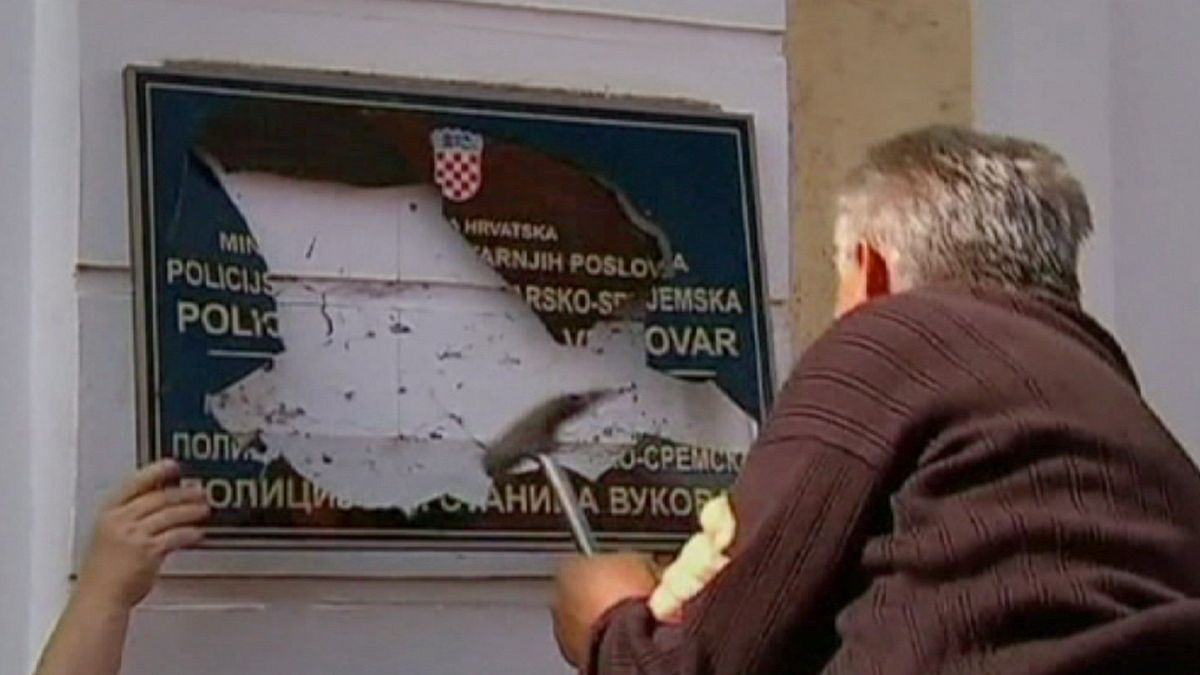It stems from a law to protect Serb minority rights, but in the Croatian city of Vukovar, the introduction of the Cyrillic alphabet on public signs has reopened the wounds of an old conflict.
Vukovar was virtually destroyed during the wars that erupted after the break-up of Yugoslavia in 1991. Today, it is being rebuilt but remains a symbol of Croatia’s fight for independence – a fight better known as the Homeland War. Now, a new kind of symbol is causing an uproar: that of Cyrillic signs erected on public buildings.
A 2011 census has shown that Serbs make up over a third of Vukovar’s population. According to Croatia’s constitutional law on minority rights, their language and alphabet is protected. The first Cyrillic signs went up in September, but they were torn down just as quickly by Croatian war veterans. Protesters argue that Cyrillic is a reminder of when Vukovar stood alone against a Yugoslav army unhappy with Croatia’s declaration of independence. And they paid the price.
A war veteran, Danijel Rehak heads the Association for Croatian Prisoners of War. He took part in the recent protests:
“We are against the Serbian language and Cyrillic signs because the aggression on Vukovar in 1991 was committed with those letters. 5,000 of our fellow citizens vanished in that aggression: defenders, civilians, children and the elderly, 401 are still listed as missing,” he told euronews.
In August 1991, the Yugoslav army and local Serb milita groups attacked Vukovar after Croatia declared independence. The siege lasted three months and Vukovar was integrated into the Serb Republic of Krajina for the next four years. One of the most horrific stories of this war was the massacre of many patients and staff at Vukovar hospital.
Vesna Bosanac was in charge of the hospital during the siege. She took care of the wounded. Today, this national icon claims that successive Croatian governments have failed to understand the emotional hold Vukovar still has on the nation’s soul. She explains: “When we came back here after the peace accord in 1997 it was all in Cyrillic. And then the process of peaceful reintegration began and everything that was in Cyrillic was no longer valid. And now, because of the census conducted in 2011, Cyrillic signs have been erected on official buildings again. Cyrillic wouldn’t be a problem if people here had healed their wounds, if they had found their dead and missing, but they haven’t, and inflicting Cyrillic is like pouring alcohol on an open wound.”
Today, the hospital basement is a museum which serves as a reminder of the suffering that took place in Vukovar and how many people felt forgotten and even sacrificed by a government fighting their nationalist wars. Although Croatia is an EU member state, people still argue that Vukovar is being used for political gain.
Meanwhile, the Zagreb government claim the constitutional laws protecting the Cyrillic alphabet were necessary to fall in line with EU legislation on minority rights.
Fred Matic, Croatian Minister of War Veterans, told euronews a key ingredient is still missing for a lasting peace:
“The Serbs have not undergone the catharsis of accepting what happened with the former Yugoslav People’s Army, with Serbia and Montenegro who committed aggression against Croatia. They simply still haven’t come to terms with it. There is also a partial responsibility on the shoulders of Croatia, but Croats won’t take responsibility until Serbs take the blame for what they did from the beginning,” he said.
Many in Vukovar are not ready to accept responsibility for the past and move forward together. The time is not ripe for this healing. These feelings run deep into the heart of Vukovar’s school system. Croatian and Serb children arrive at school together. Then they go their separate ways: Croatians into one class and Serbs into another.
Serb students learn both Latin and Cyrillic alphabets. They also learn Serbian history as part of the peace accord to help Serbs keep their national identity. Zeljko Kovacevic, the school’s principal, is an ethnic Serb. He lived in Vukovar throughout the siege and is well-respected by both communities. He told euronews that it’s the adults who block integration, not the children:
“Politics define the rules of the game and people stick to them. There is no work so people clutch at straws and don’t think independently. It irritates me when educated people don’t think things through. If they did, the city would come back to life, with lots of new ideas, better schools and children finally learning together.”
Critics of Vukovar’s school system argue that despite the so-called corridor comradery outside of class, segregated schools offer little hope of Vukovar moving on from on its past. But for many parents, the problem is explaining the history to their children.
While opponents to the Cyrllic signs are calling for Vukovar to be exempt from this minority law, there is fear on both sides that Vukovar will remain divided by its past.
